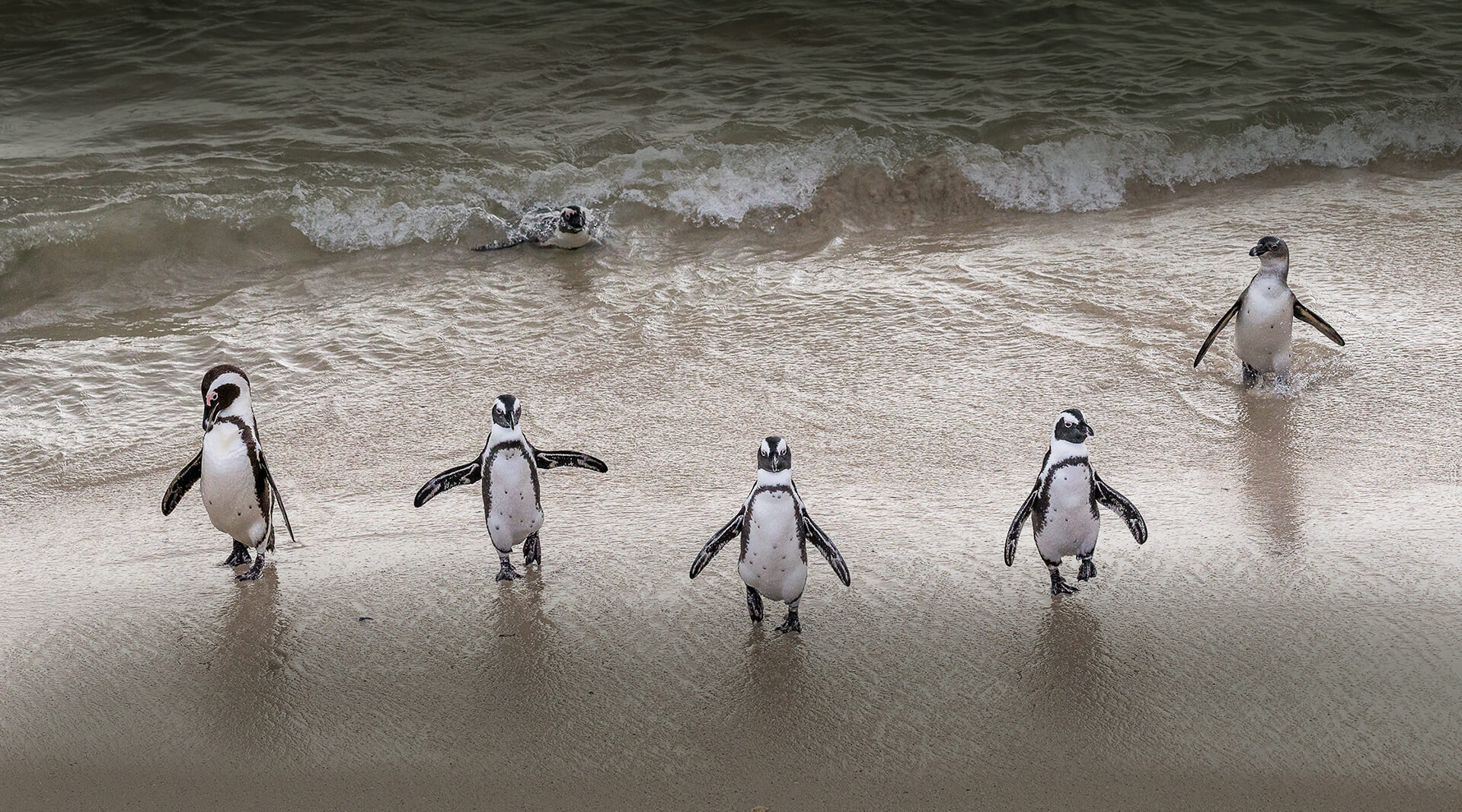African Penguins: A Disappearing Colony
IUCN Conservation Status: Endangered
These tuxedoed birds are immediately recognizable, with one exception: there’s no snow and ice for African penguins. They split their time between the cool waters of the southern Atlantic Ocean and in the warm climate of the rocky beaches of southern Africa. Locals have had to learn how to share space with these warm-weather penguins—some people even find the birds burrowing in their own backyards.
But humans imperil penguins too. Penguin habitat have been bulldozed in favor of new development, oil spills threaten their safety, and environmental changes and food shortage due to high fishing pressure have left them starving. As a result, African penguin populations have plummeted.
Penguins are colony birds—there is safety in numbers. Penguins are struggling to find safe places to breed and enough food to survive, and their colonies are dwindling. Bonded penguin pairs take turns incubating their eggs and feeding their chicks, and they need a safe place to raise their families. Until chicks are big enough to fend for themselves, penguin parents rely on nest burrows to keep their families safe from predators, storms, and the heat of the African sun.
San Diego Zoo Wildlife Alliance partners with the Southern African Foundation for the Conservation of Coastal Birds (SANCCOB) to help strengthen penguin populations disrupted by oil spills and low fish availability.
A Global Response
Penguins need clean, dry feathers that keep them waterproof, so oil spills are catastrophic events. The oil is like thick sticky tar, and glues their feathers together. Oiled birds can’t clean themselves, and they can’t get warm or dry. Getting oiled means starvation, too: unable to swim without its warm, protective feathers, the birds can’t catch the fish they need to survive. The only hope for an oiled penguin is to be rescued and rehabilitated until it can be returned to the wild.
In partnership with SANCCOB, we’re helping save these birds. We're helping rescue, rehabilitate, and release penguins who have been oiled, abandoned, or injured. Rehabilitation efforts can take days, weeks, months, or years, depending on the individual penguin’s condition. Each year, some of our wildlife care specialists travel to South Africa to assist SANCCOB with chick rehabilitation.
And it’s working. We’ve seen many hand-reared and rehabilitated penguins successfully breeding in the wild, thus bolstering the wild population.
“We all understood the importance of the work we were doing,” wrote Debbie Denton, wildlife care specialist at San Diego Zoo Wildlife Alliance, about one of her recent trips to South Africa to help the penguin population there. “We understood the threats and challenges to the wild population. We knew the impact our work would have on the wild population.”
Threats to Survival
Oil spills are not the only thing causing African penguin populations to plummet. Their numbers have declined by 70 percent in the last 20 years in South Africa, and habitat loss and lack of fish are taking a major toll. Until chicks are big enough to fend for themselves, penguin parents rely on nest burrows to keep them safe from predators and the heat of the African sun. Habitat loss due to extreme weather events linked to climate change reduce the available space for penguins to breed.
Where fishery operations overlap with penguin feeding grounds, penguins are increasingly finding themselves competing with humans for food. Nestlings can perish when parents have to travel long distances to find enough food for themselves and their chicks.
Innovation at Work for Wildlife
San Diego Zoo Wildlife Alliance supports an innovative project that uses passive integrated transponder tags to monitor residents. Another project monitors penguins’ travel or activity patterns at sea, using GPS technology. And with the construction of the Penguin Beach habitat at the San Diego Zoo, our researchers are also gaining valuable knowledge about the African penguins that we can share with our partners in Africa.

